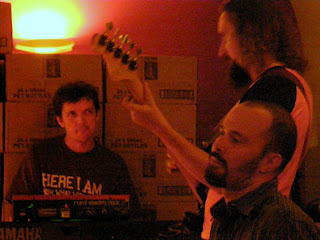 Crickey.com doesn’t often venture into the jazz scene in Canberra, but it seems there’s a (very minor) controversy going on in its letters pages over the new government’s ways.
Crickey.com doesn’t often venture into the jazz scene in Canberra, but it seems there’s a (very minor) controversy going on in its letters pages over the new government’s ways.Simon Thomsen writes: Re. "Tips and rumours" (yesterday, item 8). Crikey published: "For his Australia Day diplomatic corps bash at the Lodge, Rudd or his office have chosen a jazz combo, replacing the old bush bands singing Aussie songs that Howard used to favour. And I thought Rudd was an Australian music fan!" Why would Rudd having a jazz combo for Australia Day (over a bush band) be incompatible with Australian music? Fair dinkum! Has your anonymous tipster never heard of Paul Grabowsky, James Morrison, Don Burrows, Renee Geyer, Kate Ceberano, Katie Noonan, Vince Jones, Grace Knight, Bernie McGann, The Necks, The Basement, Wangaratta, Galapagos Duck and their 90s album raising funds to save the hairy-nosed wombat... Strewth cobber, I thought we voted out that sort of cultural cringe last November.
(Crickey online, link, 25 Jan 2008).
I’m with the respondent. It’s obvious to me that Australia is a rich, educated and culturally diverse country. I don’t like to see pollies play the nationalist/Sons of Empire game. Howard excelled and revelled in just this sort of spin. Probably there’s spin in Rudd’s choice too, even if only for the local diplomatic corps: his war on education, and a more inclusive, more modern vision of Australia. I'm much more comfortable with this than the Howard picture. Given this is an ex-diplomat entertaining the local reps of other countries on our national day, this seems a particularly significant gesture.
I can claim a little part in this. When PM&C (Department of Prime Minister & Cabinet) found ANU closed for the holidays, they got onto CJ for names of Jazz School students who could play. Interestingly, they asked for students (note, not James Morrison or his ilk). I provided a few names, and James LeFevre got the gig in the end. Congrats to James. That’s memorable: playing for the PM at the Lodge on Australia Day. But congrats must also go to the PM for his support, awareness and interest. It’s a good sign.
 Marie LeBrun sang with the James LeFevre Quintet. The Quintet comprised James LeFevre (sax, leader), Rob Lee (trombone), Ben Foster (keyboards), Phill Jenkins (bass), Evan Dorrian (drums).
Marie LeBrun sang with the James LeFevre Quintet. The Quintet comprised James LeFevre (sax, leader), Rob Lee (trombone), Ben Foster (keyboards), Phill Jenkins (bass), Evan Dorrian (drums).To finish, let me recount my similarly memorable gig. I was playing with a Bush Band (quite a coincidence!) in the late '80s, the Bicentennial era. We played at Rupert Murdoch's property at Cavan for a party he staged for ~24 visiting US newspaper publishers and editors. All the local dignitories of the time were there: Keating, Wran and the like. Hawke arrived late and by helicopter. Impressive entrance? To us, maybe, but the world-weary editor we were chatting to just muttered "tinpot dictator". He'd obviously seen as much elsewhere.












